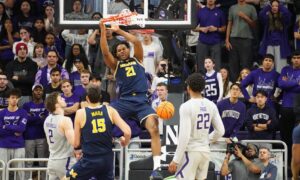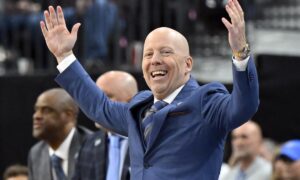Limping and slumping, Michigan ran head first into a buzz saw at the McKale Center in Tucson on Saturday afternoon.
The Wolverines were met by a bigger, stronger, more athletic and simply better opponent. While Michigan was able to hold on for parts of the first half, trailing by just 11 points at the break, eventually the Wildcats ran the Wolverines out of the gym for an 80-53 victory.
Michigan just didn’t have any answers for Arizona’s size inside or its defensive abilities on the perimeter.
Caris LeVert was rendered ineffective by the defensive combination of Rondae Hollis-Jefferson and Stanley Johnson, finishing with just 8 points on 2-of-9 shooting with 5 turnovers in 35 minutes and his supporting cast wasn’t any better. Derrick Walton showed flashes in the first half, but only made two shots in 34 minutes. Zak Irvin finished with 14 points didn’t make a real impact on the game until it was out of hand.
Arizona’s domination of the game was due to its ability to control the rim. The Wildcats outscored Michigan 42-16 in the paint for the game and dominated the offensive glass in the second half.

This Arizona team is very good, especially on the defensive end of the floor, and is easily one of the elite teams in the country. But that doesn’t excuse Michigan’s lackluster performance.
This is a game that Michigan probably would have lost nine times out of ten, but it didn’t even look like Michigan belonged on the same floor on Saturday afternoon.
John Beilein is known for his team’s reliance on the three-point shot, but the often-forgotten barometer of whether ‘Beilein ball’ is working properly is two-point shooting percentage. The offense is reliant on the three to create enough spacing to create easy two-point opportunities. When those opportunities aren’t there — either via cuts, ball screens or transition — it becomes ugly quickly.

Michigan has only shot better than 50% on two-point attempts in one game this season, a blowout win over Nicholls State. Last year’s team shot 52.7% on twos and managed to shoot 50% or better in an impressive 11 out of 18 Big Ten games (H/T: John Gasaway)
Michigan has only shot better than 50% on two-point attempts in one game this season
Simply put, Michigan doesn’t have anyone that can finish around the basket. LeVert isn’t getting layups, he’s getting 8-foot jumpers. Kameron Chatman doesn’t have the strength or bounce to finish at the basket and Ricky Doyle and Mark Donnal aren’t reliable enough to finish against Arizona’s massive frontcourt.
Last year when Nik Stauskas would struggle – it feels like ages ago, but remember he went 0-2 from the floor in a blowout loss at Duke last fall – Michigan had Caris LeVert to pick up the slack. This year’s team doesn’t have that secondary option. Derrick Walton has done it in stretches, but generally needs transition play to make his impact, while Zak Irvin has the occasional hot shooting game. But Michigan needs to find another way to generate offense or the Wolverines could be in for more long nights like this.
The offense was bad, but the defense simply fell apart. Arizona started strong, but Michigan’s defense actually made enough plays to stay within striking distance in the first half. The Wolverines cleaned up the defensive glass in the first half (rebounding all of Arizona’s misses) and created just enough turnovers to generate some easy offense. In the second half? Arizona rebounded half of its misses and the Wolverines unraveled. The mistakes in the second half were rudimentary for a team at this level: botched switches, not stopping the ball in transition, missed box outs. Michigan just wasn’t good enough defensively to win and the 1.22 points per possession that Arizona scored feels generous.
Michigan has been punked on the road plenty of times before and has figured out a way to bounce back. This team isn’t as bad as it looked over the last seven days, but there’s not a lot of time to get better. In his post game, Beilein stressed how important it was for this team to get better day-by-day to start to ease the gap between teams like this and Michigan. The Wolverines have a week off to wrap up exams and try to figure things out against an inconsistent, yet talented SMU team at home.
![KKKSVSVZSXPRBKK.20141214004511[1]](http://www.umhoops.com/wp-content/uploads/2014/12/KKKSVSVZSXPRBKK.201412140045111.jpg)
Player Bullets:
- Caris LeVert: LeVert just couldn’t crack Arizona’s defense. He could beat the first man, but he constantly settled for off balance jumpers just outside the paint. We’ve profiled in the past that this is a shot that LeVert struggles with and we’ve seen a lot of it this year. The Wolverines dialed up ball screen after ball screen for LeVert, but just couldn’t get things going.
- Derrick Walton: Walton gave Michigan a real spark (and his 5 assist to zero turnovers were impressive) in the first half, but the missed free throws were backbreakers. Walton finished 2-of-7 from the floor and 3-of-7 from the stripe. Walton’s half court offense is still far behind his transition offense and I think he needs to be more aggressive pushing the offense and utilizing his quickness. In the post-game, Walton said his toe is getting better, but he doesn’t look nearly as explosive as he was early in the season.
- Zak Irvin: Michigan needs a lot more from Irvin and most importantly, he needs to stop letting his shooting woes affect him on the other end of the floor. It’s happened often enough this season to become a trend and it was unsettling to see him get yanked just seconds into the second half after botching the first play. Beilein said he was impressed with how he recovered, but Michigan needs more from the 6-foot-6 sophomore.
- Kameron Chatman: Chatman continues to a show a few flashes. He made an early three and looked alright out of the gate, but then picked up two quick fouls. His length (three steals) is valuable on defense, but he struggled a few times against Brandon Ashley in one-on-one situations. The key for Chatman is being able to finish around the basket and his problem is different than LeVert’s. Instead of pulling up from 12 feet, Chatman tries to get all the way to the rim and generally ends up throwing up an off balanced attempt.
- Ricky Doyle: Doyle was no match for Tarczewski on the low block, but he did managed 8 points and three rebounds. It feels like Michigan could work the ball to Doyle on the block (especially against teams that aren’t so massive) a bit more often because he looks comfortable down there. He’s not there yet, but he still looks to be the most promising of Michigan’s post players.
- Mark Donnal: Ricky Doyle and Max Bielfeldt played the lions share of the minutes in the second half, but Donnal made a few nice plays – mostly in garbage time – including a three-point jumper and a nice catch and lay-in in transition.
- Spike Albrecht: His three late in the first half helped Michigan stay within striking distance and broke a big Arizona run, but he wasn’t able to do much more. Those were his only points of the game and he also handed out three assists.
- Max Bielfeldt: At 6-foot-7, it was always going to be tough for Bielfeldt to hold his own inside against Arizona so by playing him Michigan was hoping for some offensive punch. He couldn’t find the basket finishing 0-4 from the floor with two missed triples and a turnaround jumper attempt.
- Aubrey Dawkins: Dawkins got some solid run, recording 12 minutes, but he missed all three of his long distance attempts. They were open, and pretty good looks, but they just didn’t fall. If he can get, and make those shots, he could be a weapon. However, his roughness around the edges was still evident as he turned it over twice and drifted out of position for a drive-and-kick to cause another turnover.









